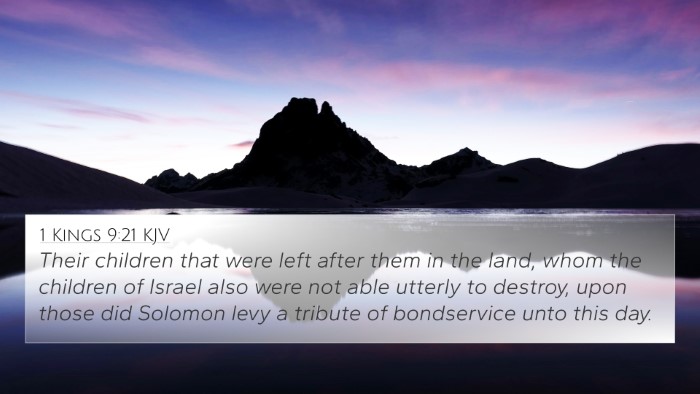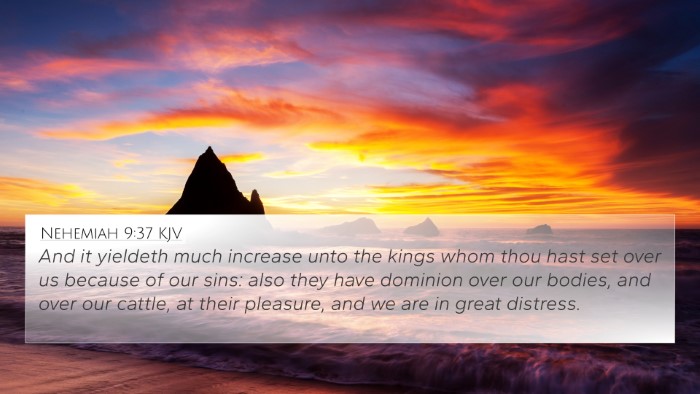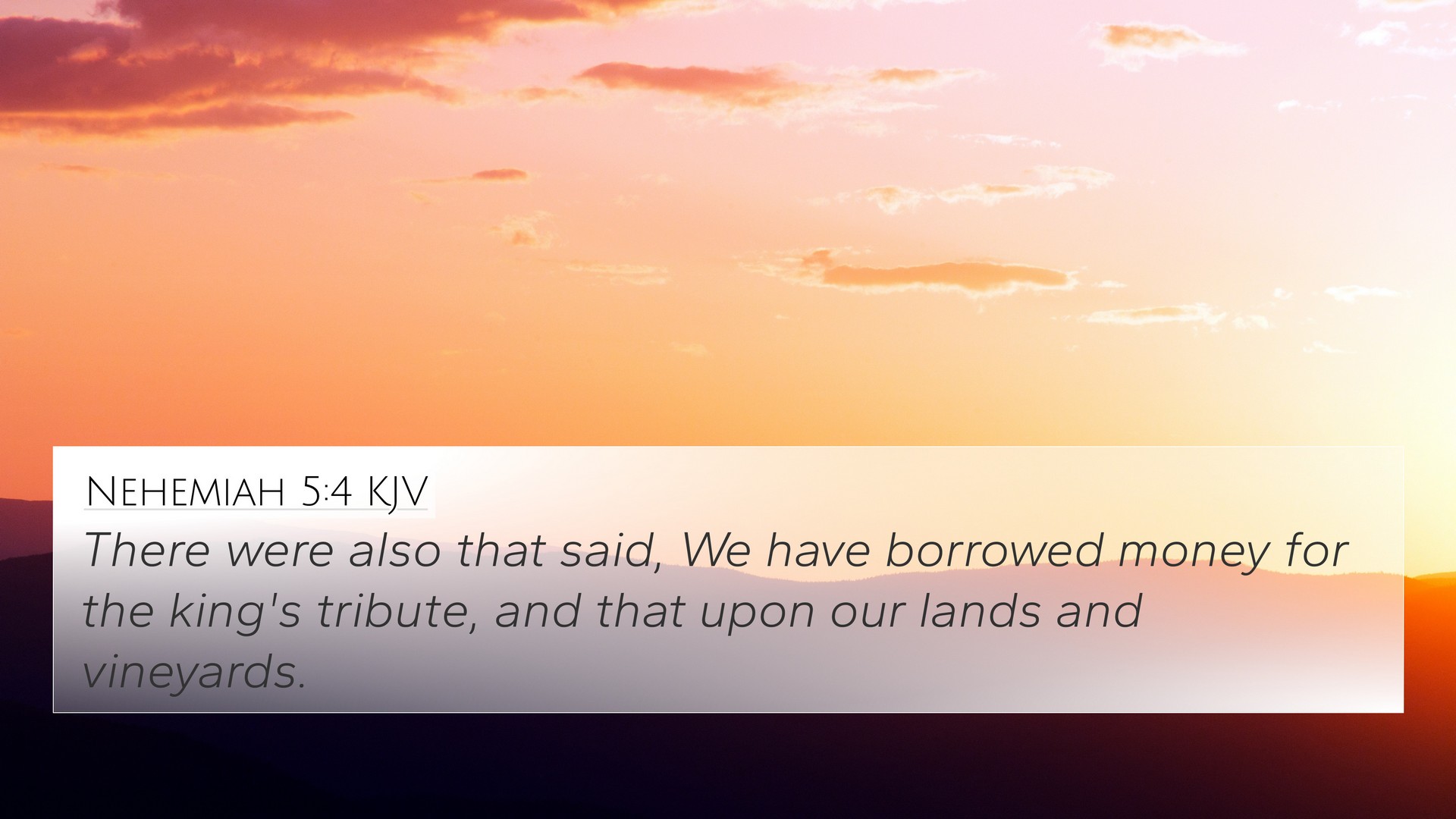Old Testament
Genesis Exodus Leviticus Numbers Deuteronomy Joshua Judges Ruth 1 Samuel 2 Samuel 1 Kings 2 Kings 1 Chronicles 2 Chronicles Ezra Nehemiah Esther Job Psalms Proverbs Ecclesiastes Song of Solomon Isaiah Jeremiah Lamentations Ezekiel Daniel Hosea Joel Amos Obadiah Jonah Micah Nahum Habakkuk Zephaniah Haggai Zechariah MalachiNehemiah 5:4 Similar Verses
Nehemiah 5:4 Cross References
There were also that said, We have borrowed money for the king's tribute, and that upon our lands and vineyards.
Uncover the Rich Themes and Topics of This Bible Verse
Listed below are the Bible themes associated with Nehemiah 5:4. We invite you to explore each theme to gain deeper insights into the Scriptures.
Nehemiah 5:4 Cross Reference Verses
This section features a detailed cross-reference designed to enrich your understanding of the Scriptures. Below, you will find carefully selected verses that echo the themes and teachings related to Nehemiah 5:4 KJV. Click on any image to explore detailed analyses of related Bible verses and uncover deeper theological insights.

Ezra 4:13 (KJV) »
Be it known now unto the king, that, if this city be builded, and the walls set up again, then will they not pay toll, tribute, and custom, and so thou shalt endamage the revenue of the kings.

Ezra 4:20 (KJV) »
There have been mighty kings also over Jerusalem, which have ruled over all countries beyond the river; and toll, tribute, and custom, was paid unto them.

Deuteronomy 28:47 (KJV) »
Because thou servedst not the LORD thy God with joyfulness, and with gladness of heart, for the abundance of all things;

Joshua 16:10 (KJV) »
And they drave not out the Canaanites that dwelt in Gezer: but the Canaanites dwell among the Ephraimites unto this day, and serve under tribute.

1 Kings 9:21 (KJV) »
Their children that were left after them in the land, whom the children of Israel also were not able utterly to destroy, upon those did Solomon levy a tribute of bondservice unto this day.

Ezra 7:24 (KJV) »
Also we certify you, that touching any of the priests and Levites, singers, porters, Nethinims, or ministers of this house of God, it shall not be lawful to impose toll, tribute, or custom, upon them.

Nehemiah 9:37 (KJV) »
And it yieldeth much increase unto the kings whom thou hast set over us because of our sins: also they have dominion over our bodies, and over our cattle, at their pleasure, and we are in great distress.
Nehemiah 5:4 Verse Analysis and Similar Verses
Understanding Nehemiah 5:4
Nehemiah 5:4 reads:
“There were also those who said, ‘We have borrowed money for the king’s tax on our lands and vineyards.’”
This verse illustrates a significant issue faced by the Jewish community during Nehemiah's time, highlighting the struggles associated with leadership, poverty, and economic injustice. Below is a summarized interpretation of this verse, derived from insights in public domain commentaries, providing a comprehensive understanding of its meaning.
Context and Setting
During Nehemiah's governance in Jerusalem, the Jewish community faced severe challenges, including external opposition and internal strife. The return from exile had been an arduous journey, and the rebuilding of Jerusalem's walls was accompanied by significant economic burdens. The Israelites, struggling under heavy taxation from the Persian Empire, found themselves in dire circumstances.
Verse Interpretation
According to Matthew Henry, this verse underscores the plight of the poorer classes who were compelled to borrow money due to oppressive taxes, creating a cycle of debt that aggravated their already precarious situation. The Jewish people were facing not only the king's demands but also the weight of their economic hardships, prompting a plea for mercy.
Economic Injustice
Albert Barnes emphasizes the notion of economic injustice depicted in this circumstance. The people's need to borrow money reflects systemic inequalities that often accompany leadership during turbulent times. They were burdened not just by the tax itself but by high interest rates imposed by fellow Jews, which Nehemiah later addresses through his reforms.
Leadership and Responsibility
Adam Clarke points out the responsibilities of leaders in addressing the grievances of their people. This verse serves as a call to action for Nehemiah to recognize and correct the injustices occurring among his own people. It reflects a theme echoed throughout Scripture: the necessity for leaders to uphold justice and equity among their constituents.
Cross-Referencing Biblical Texts
Nehemiah 5:4 illustrates connections with numerous other Biblical verses, reinforcing themes of social justice, economic stewardship, and communal responsibility. Here are connections that enrich understanding:
- Exodus 22:25: "If you lend money to any of my people who are in need, do not be like a money lender; charge no interest."
- Leviticus 25:35: "If your brother becomes poor and cannot maintain himself, you shall support him as though he were a stranger and a sojourner, and he shall live with you."
- Proverbs 22:7: "The rich rules over the poor, and the borrower is the slave of the lender."
- Isaiah 58:6-7: "Is not this the fast that I choose: to loose the bonds of wickedness, to undo the straps of the yoke, to let the oppressed go free, and to break every yoke?"
- Jeremiah 22:13: "Woe to him who builds his house by unrighteousness, and his upper rooms by injustice, who makes his neighbor serve him for nothing and does not give him his wages."
- Matthew 23:23: "Woe to you, scribes and Pharisees, hypocrites! For you tithe mint and dill and cummin, and have neglected the weightier matters of the law: justice and mercy and faithfulness."
- James 5:1-4: "Come now, you rich, weep and howl for the miseries that are coming upon you... Behold, the wages of the laborers who mowed your fields, which you kept back by fraud, cry out against you."
Thematic Connections
The passage links with broader themes within Scripture, specifically those that probe the relationships between the rich and the poor, the responsibilities of leaders, and God’s call for justice:
- Economic Justice: The need for equitable treatment of the poor is a recurrent theme throughout the Bible.
- Community Responsibility: Each individual has a role in maintaining the well-being of their community, particularly through fair practices.
- Divine Justice: God’s concern for justice and the plight of the oppressed is foundational to His character and will.
Applications and Lessons
For contemporary readers, Nehemiah 5:4 serves as a poignant reminder of the struggles against systemic injustices. It challenges believers to:
- Recognize inequalities within their communities.
- Advocate for those who are marginalized and oppressed.
- Ensure financial dealings are handled with integrity and compassion.
- Pursue communal well-being over individual gain.
Conclusion
Nehemiah 5:4 invites an introspective examination of one's actions and the societal structures we engage with. It encourages a response rooted in compassion, justice, and equity, reflective of God's divine nature. The study of such verses, in conjunction with the wider Biblical narrative, enriches one's faith and understanding of God's intentions for His people.
Resources for Further Study
To explore verse connections further, consider utilizing various tools for Bible cross-referencing and study:
- Bible Cross-Reference Guide: Helps identify thematic links across both Testaments.
- Bible Concordance: A useful resource for quickly locating significant terms related to themes of justice, debt, and mercy.
- Cross-Reference Bible Study Methods: These methods can deepen understanding of how Nehemiah's leadership challenges echo throughout Scripture.


